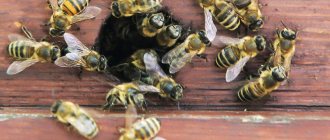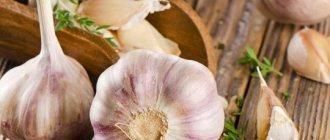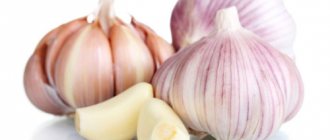For the gastrointestinal tract
Garlic juice, when consumed as a raw vegetable, has an aggressive effect on the walls of the gastrointestinal tract. When consumed in moderation by a healthy person, such an irritating effect does not cause significant harm to the body. In people suffering from chronic inflammatory or erosive-ulcerative diseases of the digestive organs, garlic can cause an exacerbation of the existing disease and even perforation of the thinned walls of the stomach or intestines.
People with inflammatory diseases of the liver and pancreas should also not eat garlic: eating this vegetable can provoke an exacerbation of chronic inflammation or a painful attack.
Nutritionists have dispelled popular myths about garlic, ginger and honey
Photo: depositphotos/teresaterra
Experts have dispelled popular myths about foods that boost immunity. These include garlic, ginger and honey, the Izvestia newspaper reports.
Nutritionist and medical director of BioData Anna Ivashkevich told the publication that garlic really stimulates the immune system, but it should be used with caution.
“If there are no problems with the stomach, intestines, or discomfort from eating garlic, then you can eat it. But it will be a couple of slices a day. And if there are problems with the gastrointestinal tract, then even this amount is too much,” said the doctor.
Nutritionist Inna Zaikina also speaks about the dangers of frequent consumption of garlic. According to her, it is especially harmful to eat it on an empty stomach.
“Garlic in large quantities is contraindicated for patients with exacerbation of gastric ulcers, pancreatitis, gastroesophageal reflux disease and cholelithiasis,” added Zaikina, explaining that such a restriction is due to the ability of garlic to stimulate the secretion of gastric juice and bile, which can aggravate the symptoms of diseases.
In turn, nutritionist, nutritionist, therapist, member of the Russian Union of Nutritionists, Dietitians and Food Industry Specialists Alexandra Razarenova notes that ginger should not be considered a panacea or a reliable remedy for colds.
Its use is also contraindicated for people suffering from diseases of the gastrointestinal tract.
For people who do not have ulcers or gastritis, excessive consumption of ginger is also not recommended. According to therapist, nutritionist, and nutritionist Maria Chernyaeva, the optimal dose at one time is no more than 80–100 grams.
Margarita Provotorova, a laboratory medicine consultant at the Center for Molecular Diagnostics of the Central Research Institute of Epidemiology of Rospotrebnadzor, is completely convinced that products that are usually consumed during seasonal epidemics and colds do not actually reduce the risk of infection and are not capable of dramatically strengthening the immune system.
“It’s a big myth that garlic, lemon and onions are immunomodulators. These are healthy products, they should be included in the diet, but not as a product that can dramatically strengthen the immune system,” warns Provotorova.
Citrus fruits will not save you from seasonal diseases. The doctor notes that, according to a number of studies, ascorbic acid, found in large quantities in lemons, grapefruits and oranges, does not reduce the risk of contracting respiratory viral infections.
Honey is not a healing agent, says nutritionist Mikhail Ginzburg.
“Honey for tea serves some purpose. There is a warming, tonic effect, partly associated with the tea itself,” admits the expert.
The nutritionist notes that honey is much richer in composition than sugar, but it does not have a bactericidal or virusicidal effect.
During the period of colds, Ginsburg recommended abstaining from both honey and sugar, noting that excessive consumption of honey can aggravate diseases such as pancreatitis. In addition, honey often causes allergies. And in this case, it should be immediately excluded from the diet.
Margarita Provotorova emphasizes that there is no magic remedy that can strengthen the immune system, especially in an emergency. A varied and healthy diet that includes sufficient protein from meat and dairy products, as well as vitamins and microelements, helps to truly achieve resistance to viruses.
Earlier, nutritionist Yulia Chekhonina named a seasonal product that will help you lose weight. According to her, people who are watching their weight need to pay attention to pumpkin, which can be found in most Russian stores in mid-autumn.
"Doctor 24": popular autumn myths
For blood clotting
People who take anticoagulants and antiplatelet agents should consume raw garlic in very limited quantities, since the spicy vegetable enhances their effect.
For the same reason, it is not recommended to eat garlic:
- women before and during menstruation;
- people before and after operations;
- patients planning to visit the dentist in the near future;
- persons with a tendency to increased bleeding.
The property of garlic to reduce blood viscosity can cause nasal, gastric, uterine or other bleeding.
Harm of garlic
If a patient has serious cardiovascular diseases, then it is not recommended to use garlic as a panacea, since in this case it can only harm the body. Yes, the substances in garlic promote vasodilation and blood flow to the heart, but with some heart problems this may only have a negative effect in the form of the following symptoms:
- chest pain,
- lack of air, suffocation,
- interruptions in the rhythm of the heart,
- tachycardia,
- migraine,
- general poor health.
It is also worth considering that garlic is almost immediately absorbed by the human body, which means its effect on the heart will be immediate. Therefore, if you suffer from interruptions in heart function and increased heart rate, then it would be best to completely exclude garlic from your diet. Otherwise, you risk triggering an attack of tachycardia and arrhythmia, which can lead to a heart attack. Also, if you nevertheless ate garlic and felt that you felt ill, we recommend that you immediately consult a doctor to exclude the possibility of negative consequences.
harm from garlic
For the brain
Garlic contains chemical compounds that inhibit brain activity, in particular the sulfone-hydroxyl ion. This chemical has the ability to penetrate the blood-brain barrier and have a depressant effect on the brain matter.
The effect of sulfone ion on brain activity was studied back in the 50s of the last century, when large-scale tests were carried out on pilots. Research has found that the reaction speed of pilots who ate garlic before the flight was several times slower than the reaction speed of those colleagues who refrained from eating this vegetable before the flight.
For immunity
In addition to its immune-strengthening effect, garlic can cause allergic reactions, provoking the immune system to respond. Doctors believe that the immune system reacts to allicin contained in the vegetable, a sulfoxide compound formed when garlic cells are mechanically damaged.
In some sensitized people, a reaction to garlic may manifest itself in the form of a rash, itching, redness of the skin, as well as other severe cutaneous and non-cutaneous manifestations. Particularly sensitive people with allergies can react to garlic with an attack of suffocation, Quincke's edema, or anaphylactic shock. These conditions are life-threatening and, without proper emergency care, can lead to death.
Garlic not only gives a specific taste and aroma to various dishes, but also helps the body fight vitamin deficiency and other diseases. The fact is that garlic also contains phytoncides - volatile substances that are released by plants. They inhibit the growth of bacteria, viruses, and fungi. Phytoncides not only kill protozoa, but also stimulate the growth of other microorganisms that are antagonists of harmful forms. This also helps fight parasites in the intestines.
“Contains allicin, which may help prevent cancer. Garlic also lowers blood pressure, improves the condition of blood vessels - prevention of atherosclerosis, correction of the lipid profile. The anthelmintic property of this plant is also known,” gastroenterologist Liliya Uzilevskaya told kp.ru.
In addition, the property of garlic to lower blood pressure and minimize the load on the heart has long been known. This vegetable is able to lower “bad” cholesterol, which provokes the formation of atherosclerotic plaques. Also, the components of the active substance allicin react with red blood cells, forming hydrogen sulfide. By the way, it is due to it that after eating a large amount of garlic a person begins to smell unique. Hydrogen sulfide reduces tension in the walls of blood vessels, promotes active blood flow, which lowers blood pressure.
Garlic has antioxidant properties. Free radicals “oxidize” the body’s cells, accelerating the aging process. Allicin in garlic neutralizes free radicals. The only problem is that whole garlic does not contain allicin. The substance begins to form after some time due to mechanical damage to plant cells - pressure, chopping garlic. Therefore, you need to chop the garlic clove and leave it to sit for 10-15 minutes. During this time, allicin will have time to form.
However, we should not forget that garlic is a rather aggressive product. You can’t eat a lot of garlic, especially on an empty stomach. It causes active secretion of gastric juice, and without food this is harmful to the mucous membrane.
“Garlic in large quantities is contraindicated for patients with exacerbation of gastric ulcers, pancreatitis, gastroesophageal reflux disease, cholelithiasis, as it stimulates the secretion of gastric juice and bile,” warns nutritionist Inna Zaikina.
For pregnant and lactating women
Garlic is a product that can cause allergies. The body of a pregnant woman has increased sensitivity to various allergens. The immunity of a woman expecting a child is constantly under strain, so during this period you should avoid eating foods that have pronounced sensitizing properties.
It is especially dangerous to eat garlic (even if a pregnant woman is not allergic to it) before giving birth. The ability of this vegetable to reduce blood viscosity before delivery can provoke complications during childbirth such as bleeding. Nursing mothers should also not eat this spicy vegetable. Vegetable phytoncides enter breast milk, changing its taste (milk begins to taste bitter) and provoking allergic reactions in the newborn.
All the benefits of garlic
FSBI "Nizhny Novgorod Reference Center of Rosselkhoznadzor" talks about the benefits of garlic, its selection and storage.
- How to choose good garlic in the store? What should you pay attention to first?
Garlic (lat. Allium sativum) is a perennial herbaceous plant. A popular ancient vegetable crop among many peoples of the world. The first mention of garlic dates back to the third millennium BC. Its pungent taste and characteristic odor are associated with the presence of organic sulfides (thioesters) in the plant. Onion slices (“cloves”) are used as seed and eaten (raw or cooked, as a seasoning). The leaves, shoots and flower stalks are also edible and are used mainly on young plants. Garlic is widely used in medicine due to its antiseptic effect.
To choose the right good garlic, you need to pay attention to the following qualities and properties of this vegetable:
First, the garlic must be dry and hard. The greatest benefit from garlic for the body will be if it is ripe and fresh.
Secondly, the size of the heads should be small, as they have a more delicate taste and can perfectly complement various dishes, acting as a seasoning for them. The head of this product itself should have large teeth and be elastic to the touch.
Thirdly, the maturity of the garlic. Unripe garlic is distinguished by hard-to-palpable cloves and an excessive amount of husk on its head. Not only is unripe garlic not as tasty and healthy as ripe garlic, but it also dries out much faster.
strictly not recommended to buy already sprouted garlic . It will taste sharp and even a little unpleasant, and there will be no beneficial qualities left in it.
- How to properly store garlic?
This vegetable can be called a record holder for long-term storage. If certain conditions are met, it lasts well all winter and we can use it until the new harvest. In order for garlic to be stored well, you need to remove it on time, prepare it correctly and comply with storage conditions.
For long-term storage, large heads of garlic are selected, which are better stored. Garlic that has not passed the shelf life test can be dried, frozen, pickled or salted. Summer varieties have a higher shelf life than winter varieties.
The main factors that affect the preservation of garlic are:
- temperature. The optimal storage temperature for winter garlic is from -2 to +2 degrees. Higher temperatures may cause fruits to begin to germinate. At lower temperatures it will freeze.
- air humidity. It should not exceed 80%. High humidity will cause the cloves to rot. If the storage location is too dry, that is, the air humidity is less than 50%, then the garlic will begin to dry out;
- illumination. It is better to store the harvest in a dark place. When storing in light, it is important to avoid exposing the heads to direct sunlight;
- air access. Excessive air access will cause the heads to dry out, so it is best to store the vegetable in open containers or boxes or canvas bags.
The vegetable is so unpretentious that it can be stored not only in specially equipped storage facilities, but also simply in an apartment, cellar and basement, on an insulated balcony or loggia, or in a refrigerator.
- in braided braids. Garlic stalks with heads woven on twine or rope provide moderate air access and take up little space during storage;
- in nylon stockings. Despite the primitiveness of such containers, they are almost ideal for storing garlic;
- in glass jars, in bags;
- in plywood or cardboard boxes, crates, wicker baskets.
garlic braid
If the temperature in the cellar does not exceed +2 degrees, then in such conditions chopped raw, dried, and oiled garlic will be well preserved.
Often, when storing garlic, problems arise: drying out, mold or rot, sprouting, yellowing on the cloves; which can be prevented if you follow the rules, clearly evaluate the available options and choose the most suitable method of preserving the vegetable.
If a poor-quality selection was made during storage, and heads infected with fungal or bacterial infections ended up in storage, then after a short time they will begin to deteriorate, rot and, most importantly, infect healthy garlic with pathogens. Therefore, it is important to periodically inspect crops sent for long-term storage and promptly remove and destroy infected bulbs. The presence of diseased heads is a signal that the seed may be infected, so effective and adequate measures should be taken to disinfect it.
- How is garlic beneficial and how is it harmful? In what portions and with what frequency should it be consumed for preventive purposes?
Garlic contains many useful substances: potassium, calcium, phosphorus, vitamins B and C, selenium, manganese, iodine and essential oils. At the same time, garlic is quite a high-calorie product - 100 g contains 149 kcal. But this spicy vegetable is consumed in small quantities and it will not harm your figure. However, garlic increases appetite.
Garlic has many benefits:
- Rich Ingredients Most of the benefits of garlic come from the high content of sulfur compounds produced when the cloves are crushed or chewed. The most famous of which is allicin.
- Garlic is a powerful immune system stimulant. Reducing blood pressure Studies by Indian scientists demonstrate that garlic or garlic supplements significantly reduce high blood pressure in people suffering from hypertension.
- Correction of the lipid profile Atherosclerosis is an extremely dangerous disease characterized by the deposition of cholesterol in the walls of the arteries and leading to many serious pathologies: coronary heart disease, myocardial infarction, chronic cerebral ischemia, etc.
- Brain protection - Free radical mechanisms lead to the destruction of cells throughout the body and cause aging. Unfortunately, the brain is most susceptible to the effects of this pathological process.
- It is known that garlic contains many antioxidant substances (S-allylcysteine, S-allylmercaptocysteine, N (alpha) - fructosylarginine), which protect neurocytes from oxidative damage and reduce the risk of developing various “age-related” diseases of the central nervous system.
- Reducing fatigue and increasing performance - Garlic has been taken since ancient times to reduce the symptoms of fatigue and increase physical and mental performance.
- Detoxification effect - The high percentage of sulfur compounds in garlic protects the body's cells from the effects of toxic heavy metals.
- Improved Bone Health - Rodent studies show that garlic increases estrogen levels in women, which in turn slows age-related bone loss and prevents conditions such as osteoporosis and pathological bone fractures.
- Prevention of malignant neoplasms - Garlic is rich in antioxidant substances that protect all human cells from the effects of free radicals, toxic metabolic products and external factors.
- Maintaining liver health - Sulfur compounds activate the enzymatic apparatus of the liver, which is responsible for the neutralization of toxic substances and their subsequent removal from the body.
The obvious disadvantage of eating garlic is bad breath, which can be eliminated if you eat garlic at the same time as: drinking a cup of strong coffee without milk; chewing a slice of lemon or a sprig of parsley; drinking milk with cinnamon or cardamom; drinking green tea with the addition of anise, myrrh or rosemary.
Use during pregnancy. Garlic can be taken by pregnant women only in the first trimester. The recommended maximum daily dose is 1-2 cloves per day.
Daily norm and rules of admission. You can eat an average of 1-3 cloves of garlic per day, the maximum daily dosage is up to 5-6 cloves. Garlic can be eaten every day; scientific studies show no significant side effects when consumed regularly in recommended doses (1-6 cloves per day). Eating garlic on an empty stomach in the morning can provoke the development of diseases of the stomach and duodenum. Taking even one clove at night can cause short-term overload of the digestive system and disrupt sleep (you must eat it no later than 1-2 hours before bedtime).
- Who is contraindicated in eating garlic?
Despite all the benefits, in some cases, using garlic can be harmful to health. The plant should not be used if the following contraindications exist:
- Obesity. Garlic is a powerful stimulant of the hunger center. Within 6-8 hours from the moment of consuming garlic, appetite increases significantly, which is fraught with excessive calorie consumption and an increase in body weight due to fat deposits.
- Exacerbations of chronic or acute inflammatory diseases of the gastrointestinal tract. In the presence of active inflammation of the intestinal wall (gastritis, duodenitis, enteritis, colitis, peptic ulcer of the stomach and duodenum), garlic causes additional irritation and can aggravate the course of pathologies or cause complications (bleeding, penetration or perforation of the walls of the digestive apparatus).
- Biliary dyskinesia of the hypermotor type. The plant increases muscle tone and increases the severity of symptoms.
- Any kidney pathologies with signs of CKD. Garlic can provoke functional disorders of the kidney filter and cause a critical increase in urea and creatinine in the blood.
- Allergic reactions. Allergy to garlic is extremely rare and usually manifests itself in a mild form (urticaria, allergic dermatitis).











